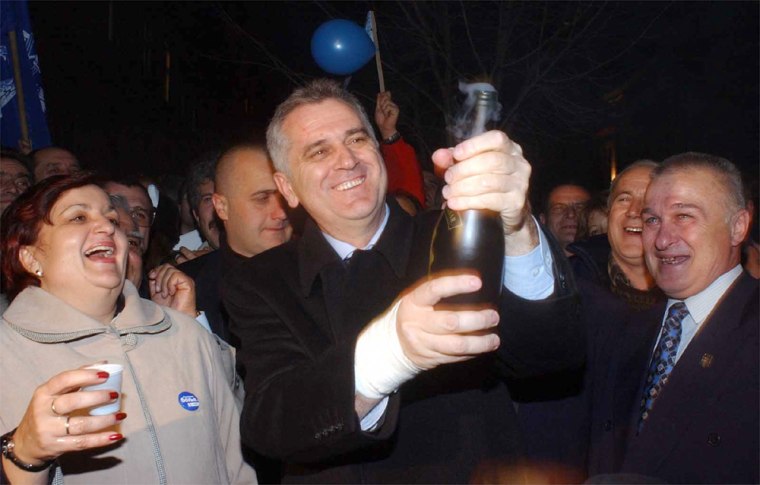Jailed former President Slobodan Milosevic and another U.N. war crimes suspect won seats in Serbia’s parliament as an extreme nationalist party swept weekend elections, according to results released Monday.
Vojislav Seselj’s Serbian Radical Party, which supported Milosevic’s Balkan war campaigns in the 1990s, won 81 seats in Sunday’s ballot for the 250-seat parliament — far more than the pro-Western groups that toppled Milosevic three years ago, the state electoral commission said.
Atrocity charges
Milosevic of the Serbian Socialist Party and Seselj are jailed by the U.N. tribunal at The Hague on atrocity charges stemming from the wars in Croatia, Bosnia and Kosovo.
They topped their parties’ lists in a parliamentary vote considered crucial for the still-volatile Balkans, meaning they each have a right to a seat. Milosevic’s Socialists won 22 seats.
Milosevic and Seselj can’t attend parliamentary sessions, but their parties can still decide to award them seats when the new parliament convenes in January.
“It would be symbolic for Milosevic to get a seat in the parliament,” said his party deputy, Ivica Dacic. “We’ll talk to Milosevic about it, and we’ll see if he wants it.”
The Radicals’ deputy leader, Tomislav Nikolic, said he spoke on the phone with Seselj briefly Monday, but claimed the conversation was interrupted by prison authorities in The Hague.
“Vojislav Seselj has been placed in isolation because of the victory he and his party gained at the elections in Serbia,” Nikolic said.
The tribunal slapped a 30-day gag order on Seselj and Milosevic during the elections, which Seselj managed to violate at least once when he addressed supporters by phone on the eve of the vote.
Murat Mercan, the head of the Europe Parliamentary Assembly observer team, Serbia sends a negative message to the world by including the war crimes suspects on candidate lists.
“While formally not in breach of the law, it shows a lack of political responsibility and is a reminder that a number of political parties in Serbia are still caught up in the denounced legacy of the past,” Mercan said.
The Radicals’ victory indicated strong public disillusionment with the pro-Western leadership that has ruled Serbia since it ousted Milosevic in a popular revolt 2000 and extradited him to The Hague a year later.
“The success of the Radicals is mainly due to failures of the outgoing government,” said Vojislav Kostunica, the former Yugoslav president who succeeded Milosevic and whose conservative Democratic Party of Serbia finished second with 53 seats.
The pro-Western Democratic Party, a separate bloc which led the outgoing reformist government, was third with 37 seats, according to the near-complete results.
The Radicals on Monday offered to form a new government with Kostunica’s party. His party, which in the past has rejected the idea of such a coalition, did not immediately respond to the overture.
Free, fair elections
The parties belonging to the Democratic bloc suggested they might join forces and try to form a government that would keep Serbia on track with democratic reforms and close ties with the West.
In Washington, U.S. officials commended Serbia for holding free and fair elections.
“We welcome Sunday’s orderly elections in Serbia and commend the Serbian people for their participation in the democratic process,” State Department deputy spokesman Adam Ereli said in a statement.
The European Union appealed for Serbia’s pro-democratic parties to unite behind a new reformist government in response to the big gains by extreme nationalists.
“I appeal to all democratic forces to work together to ensure that a new government based on a clear and strong European reform agenda can be formed rapidly,” said Javier Solana, the EU’s foreign policy chief.
The high level of support for the Radicals is a setback for the EU, which has sought to rebuild ties with Serbia since Milosevic’s overthrow.
Although the Radicals did not garner a majority that would allow them to form a new Cabinet — even in a coalition with Milosevic’s Socialist Party — they will be a tough opposition for any new government.
After campaigning on a platform of defiance to the West and accusing the post-Milosevic leadership of corruption, the Radicals have also focused on the devastated economy and from deep anti-West feelings generated by the NATO bombing of Serbia for its crackdown in Kosovo in 1999.
Milosevic, who presided over four Balkan wars, has been on trial at The Hague since February 2002 on 66 counts of war crimes, including genocide. Seselj is accused of allowing paramilitary troops under his control to murder and torture non-Serbs during the Balkan wars.
